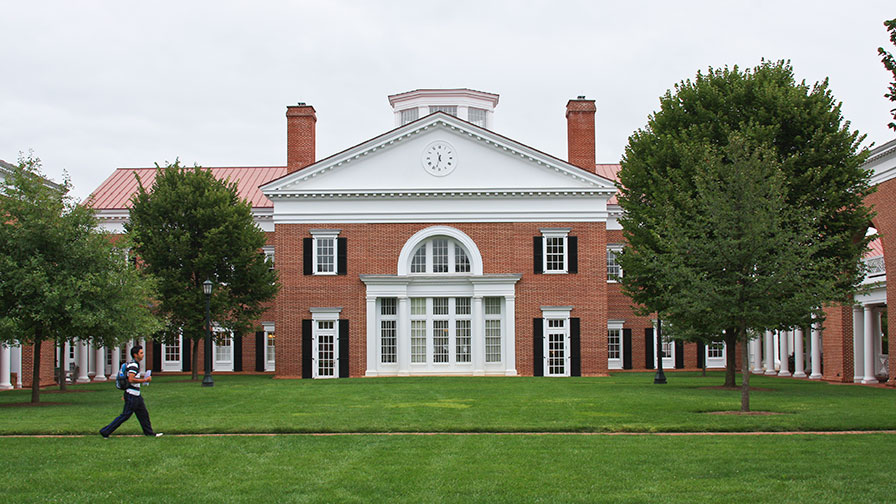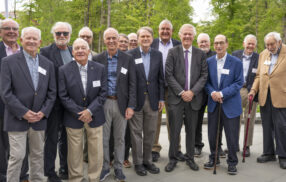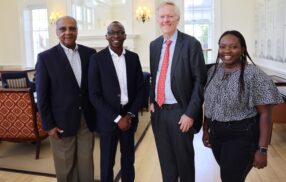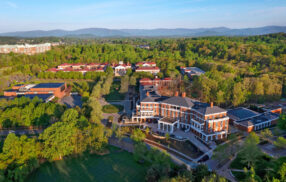
BRAD Lab Evolves From Start-up to Growth Stage With Leadership Transition
Follow the Behavioral Research at Darden Lab’s history from its foundation in 2009 at the University of Virginia Darden School of Business to today, and the story reads like a textbook on evolving an organization from startup to growth stage.
“Well, that is what we teach, you know,” Professor Morela Hernandez said with a laugh. Hernandez took over as the academic director of the BRAD Lab on 1 July to lead it into its next phase of development, one where she hopes the lab will become institutionalized as Darden’s central resource helping faculty generate richer, more diverse research with the potential to be published in top tier academic journals.
To understand the BRAD Lab’s future, it helps to look to its past.

Professor Melissa Thomas-Hunt joined Darden in 2009 and, as a self-described experimentalist, quickly realized she needed access to a pool of participants to conduct lab-style research experiments. However, such a pool simply did not exist at Darden. She raised the issue among her peers and discovered many leaders at Darden were interested in conducting participant studies to collect behavioral data because top journals were more frequently requesting behavioral research to supplement faculty members’ primary research methods.
And so thanks to what Thomas-Hunt described as nimble action from Darden providing institutional support for a grassroots effort, the BRAD Lab was founded in 2010 with a mission to support the faculty’s ability to conduct behavioral research. Almost six years later, she has led it to accomplish that and more.
As the center’s first academic director, Thomas-Hunt established an open-door policy for any Darden faculty to use the BRAD Lab’s resources and expertise. She built its support structure on a model she had seen work at other B-schools — hiring a seasoned post-doctoral researcher with the ability to advise faculty and an operational support associate to facilitate faculty getting their research done. The BRAD Lab also holds up to four research seminars per year to highlight studies that employ behavioral research methods, which helps Darden faculty see how they can use the methods in their work.
In the slow-moving world of academic research, the results seemed instantaneous.
“The initial metric that we started with was looking at submissions to UVA’s Institutional Review Board,” Thomas-Hunt said. “Just looking at the year before BRAD’s founding and the year after, there was an orders-of-magnitude increase in terms of the number of studies submitted. It was dramatic.”
Senior Associate Dean for Faculty and Research Sankaran Venkataraman said that 32 faculty and numerous doctoral students are now active in the lab, which has a pool of 4,000 participants to draw on for experiments and a group of experienced research assistants. He applauded the wide range of disciplines represented by the faculty that is active in the lab, including leadership and organizational behavior, ethics, operations, marketing, quantitative analysis and entrepreneurship.
So dramatic has the increase in demand been for the BRAD Lab’s capabilities that it has entered a new phase of organizational needs. Enter Hernandez, who like Thomas-Hunt is also taking on the role of academic director at the onset of her second year at Darden.
“I am thrilled that Morela is the person taking over as academic director,” Thomas-Hunt said. “She has a level of breadth of perspective, taste and methodology that makes her the ideal person to help connect faculty members. She really lives the multi-method.”
Hernandez will build on the foundation created by Thomas-Hunt and continue the lab’s open-door policy, office hours advising sessions, and research seminars while tackling three new priorities.
First, she says the BRAD Lab’s growth necessitates more robust, formalized policies and processes.
Second, while the lab has built Darden’s capacity to tap different participant pools, the faculty still cannot run studies at the School. “That’s a big deal,” Hernandez said. “The faculty is becoming more expert in its research methods, but lacks the capacity to run the experiments.”
Hernandez says she is leading an effort to have a space within the Camp Library redesigned to accommodate research studies.
Lastly, Hernandez will seek to continue deepening the Darden faculty’s behavioral research expertise. While submissions to the Institutional Research Board increased substantially after the BRAD Lab’s founding, publication in a major academic journal often takes four to five years. That means many of the early lab-supported research submissions are just now entering the notoriously arduous stage of revisions — often numerous pages of requests from journal editors and peer reviewers that faculty researchers must resolve.
“So our next step in what we offer is to create a research community,” Hernandez said. She’s doing so through what she calls “Lab Group,” a sort of workshop meets support group where researchers from the same area will meet to help each other overcome revision challenges and bring new ideas to improve current research. An ancillary benefit, Hernandez said, is this workshop process will lead to new ideas, collaboration and potential partnerships to conduct new research.
The first Lab Group at Darden will be comprised of management, leadership and ethics faculty, but Hernandez and Thomas-Hunt believe it can serve as a model for other groups to follow.
Hernandez won’t be tackling her ambitious agenda for the BRAD Lab alone. New post-doctoral research associate Cristiano Guarana and lab coordinator Ornuma Wawsri recently joined the team, bringing new energy to execute the expanded vision.
“Thinking about the BRAD Lab as a long-term institutional endeavor, Melissa is the founder, I hope to improve upon it in this particular growth stage, but it would be my hope that I will have the opportunity to turn it over to someone else who will bring a fresh perspective, renewed energy and take it further for all of us,” Hernandez said. “This isn’t someone’s baby, this is something that is valuable for all of Darden.”
The University of Virginia Darden School of Business prepares responsible global leaders through unparalleled transformational learning experiences. Darden’s graduate degree programs (MBA, MSBA and Ph.D.) and Executive Education & Lifelong Learning programs offered by the Darden School Foundation set the stage for a lifetime of career advancement and impact. Darden’s top-ranked faculty, renowned for teaching excellence, inspires and shapes modern business leadership worldwide through research, thought leadership and business publishing. Darden has Grounds in Charlottesville, Virginia, and the Washington, D.C., area and a global community that includes 18,000 alumni in 90 countries. Darden was established in 1955 at the University of Virginia, a top public university founded by Thomas Jefferson in 1819 in Charlottesville, Virginia.
Press Contact
Molly Mitchell
Associate Director of Content Marketing and Social Media
Darden School of Business
University of Virginia
MitchellM@darden.virginia.edu





